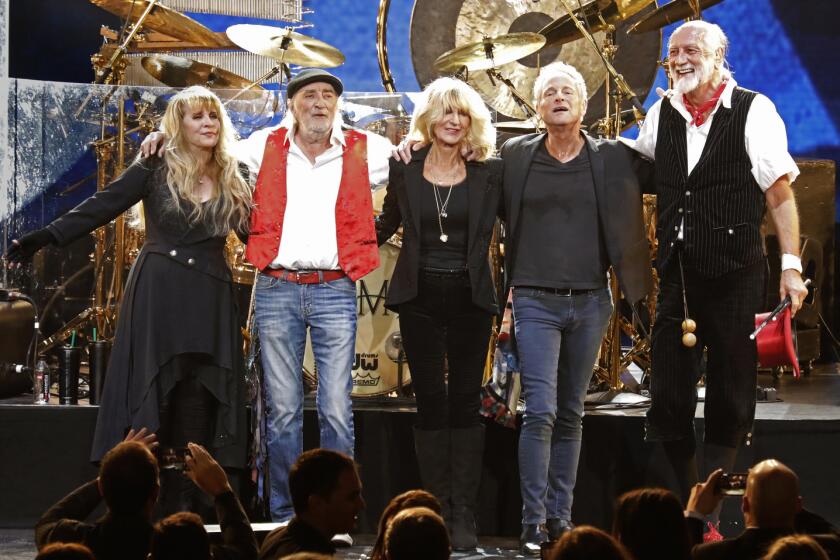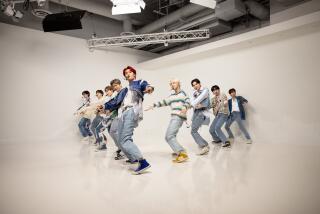Review: Blackpink’s debut album gleams and preens. So why isn’t it very much fun?
- Share via
Blackpink’s success may be the best known thing about it.
Since emerging just over four years ago, this K-pop girl group has racked up billions of streams, sold countless pieces of merch (including branded sleep masks and hand-sanitizer holders) and played the 2019 Coachella festival in a widely acknowledged first for an act of its kind.
In June, the video for its taunting “How You Like That” set a YouTube record when it was viewed more than 80 million times in 24 hours.
Yet the quartet’s speedy ascent — ahead of Friday’s release of its official debut album, no less — has come at a moment when Blackpink’s approach feels almost entirely out of alignment with pop music’s prevailing trends.

Where other young artists like Billie Eilish and the late (but never more popular) Juice Wrld are bleary and improvisational, Blackpink is polished and crisp. And where other acts use social media to emphasize their rough edges, Blackpink keeps its audience at a strategic remove with elaborate costumes and choreography that look back to an earlier, more constructed idea of pop stardom.
Think of the group as an IMAX production in a TikTok world.
TikTok user @420doggface208 brought Fleetwood Mac’s ‘Dreams’ to Gen Z on Saturday. The song’s sales have since tripled and its streams doubled.
As arguably the second-biggest act in K-pop behind South Korea’s obsessively followed BTS, the members of Blackpink — Jennie, Jisoo, Lisa and Rosé, all in their mid-20s — hold some built-in allure for the curious Western listeners they were targeting from the beginning with lyrics sung partly in English; the group, with two women who grew up in New Zealand, is part of the same globalizing movement in pop that’s brought welcome attention to Puerto Rico’s Bad Bunny, Spain’s Rosalía and Nigeria’s Burna Boy.
But Blackpink’s music, with its muscular EDM synths and its precision-geared choruses, can seem downright old-fashioned compared to the scrappier, more idiosyncratic stuff that collects near the top of Spotify’s charts. As such, it made sense when the group turned up this spring on Lady Gaga’s “Chromatica”; despite the age difference, the creative kinship was clear.
Blackpink’s new record — it’s called “The Album,” though one newfangled thing about it is that it contains only eight tracks — features cameos by two more modern types: Cardi B, the rapper more skilled than any other at allowing fans behind the scenes, and Selena Gomez, who started out in the old system but who’s proven adept at adjusting to the weird, whispery sound of current pop.

Indeed, “Ice Cream,” the song with Gomez, is the most gratifyingly stylish track here: a throbbing electro-rap banger with skittering percussion and as many sexed-up double-entendres as anything this side of Cardi’s “WAP.”
“Snow cone chilly / Get it free like Willy,” goes one memorable line, “In the jeans like Billie / You be popping like a wheelie.”
Yet Cardi herself has to make do in a clunkier number, “Bet You Wanna,” that calls to mind Meghan Trainor’s chipper mid-’10s work; you can almost hear the defeat in her voice as she rhymes “the stakes is higher” with “do what we both desire.”
Eager though Blackpink may have been to adapt, “The Album” — which the group says it recorded in part during COVID-19 isolation — still plays like a transmission from a previous era. “Crazy Over You,” with its airy wind-instrument sample, rewinds even further to the hip-hop exotica of Timbaland’s late-’90s heyday.
Which needn’t have been a problem: Pop is always eating itself — just look at BTS’ disco throwback “Dynamite.”
But “Dynamite” has a soulful exuberance that gives the song fresh life, whereas trappy Blackpink songs like “How You Like That” and “Pretty Savage” — two vaguely phrased declarations of fierce self-determination — merely evoke the layers of technology and hours of rehearsal required to create them. There’s something vaguely oppressive about “The Album,” which hardly ever provides a sense of what Blackpink’s members are all about beyond the impatience with doubters they describe in “Love to Hate Me.”
The sureness of its success aside, in that way it fails the test of old pop as well as the test of new.
More to Read
The biggest entertainment stories
Get our big stories about Hollywood, film, television, music, arts, culture and more right in your inbox as soon as they publish.
You may occasionally receive promotional content from the Los Angeles Times.












